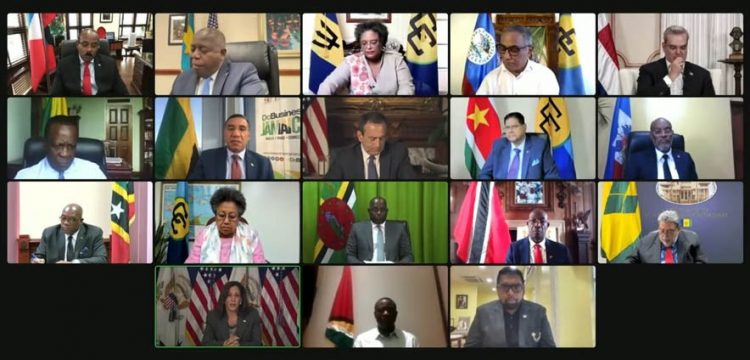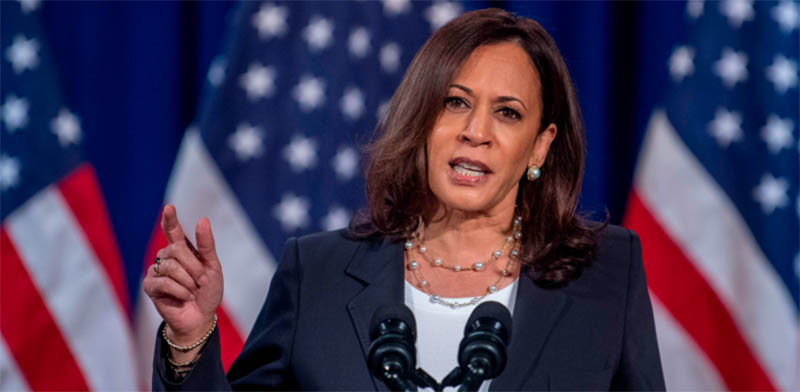President Irfaan Ali has warned about the “locking out” of new suppliers of oil like Guyana in the global drive to reduce dependence on fossil fuels.
According to a statement from the Office of the President, he was speaking on Friday during a virtual meeting between Caribbean leaders and US Vice-President Kamala Harris.
Joining the meeting in Barbados where he had stopped following a visit to the United Kingdom (UK), Ali said that while the world is heading in the direction of reducing dependence on fossil fuels, locking out new suppliers can create a monopoly for those who are currently involved in the oil industry.

This is a message that he and other government officials have stressed at international fora.
“The question is, if you’re locking out new suppliers, it is to whose advantage? We can be very well creating a monopoly for those who are already in the business, who have already extracted this natural resource and developed their own jurisdiction”, Ali said to the gathering.
He said that this is an issue that requires an “in-depth conversation” and that the region “must be part of that conversation in defining this policy going forward”.
The statement said that the President also spoke about Guyana’s standing forest, which he said stores 19.5 gigatonnes of carbon and is worth US$500b. He said that the annual revenue the country should receive from carbon credits stands at US$200m.
On the matter of climate change, adaptation and mitigation, the President contended that forested countries, such as Guyana, are not prioritised.
He said that UK PM Boris Johnson assured him last week that “he is spearheading an effort” to ensure that standing forests become a priority.
“I think this need also to be on the [US] agenda”, Ali told Harris.
The issue of climate change, according to the President, requires stronger conversations, especially when it comes to financial pledges from developed nations.
The President also spoke about energy sustainability, food security and regional security and about the bolstered relationship between Guyana and the US.
“The US is playing a major role in the development of our energy sector from the private sector’s perspective and I must say, at the diplomatic level, the representation locally has also helped us”, he told the meeting.
The President also called for a better working relationship between the United States and CARICOM, especially in understanding and respecting the policies of the region.
“There is an absolute need for the building of trust—trust in our policy formulation, and trust and predictability in what we do; trust in the partnership that we seek to endeavour and this trust, I think, must lead to an institutional arrangement, outside of the annual meeting that will allow us to address some very key issues—energy and climate change being two of them”, Ali said.
He also cited the need to address international taxation policies, the future direction of those policies and the possibility of their severe impact on the region’s economies.
“Many of our countries are facing a disproportionate application of international regulation and laws”, he said.
Priorities
In introductory remarks posted by the US Embassy here on its Facebook page, Harris cited three priorities for discussion and proposed that the meeting between the region and the Vice President be held annually.
Harris – whose father is Jamaican and whose mother was an immigrant to the US from India – cited economic recovery, security and climate and energy as the priorities. She said that she was aware that the region is particularly concerned about the trafficking of drugs and guns and the associated violence. Therefore, the US would discuss further financial and other assistance.
Citing the urgency of addressing climate matters, Harris said the meeting would discuss strengthening climate resilience and accelerating the transition to clean energy.
Critics have said that Guyana has been slow in the energy transformation as evidenced by an advertisement last month for a supplier of 50 megawatts of Heavy Fuel Oil generation.
Reuters reported that Harris spoke to the leaders from her home after testing positive for COVID-19 earlier last week. She remained asymptomatic and was also prescribed and has taken antiviral drug Paxlovid after consultation with her physicians.
In addition to CARICOM, the Dominican Republic was also represented at the meeting.






